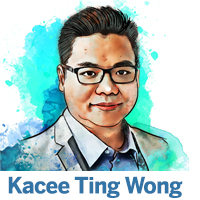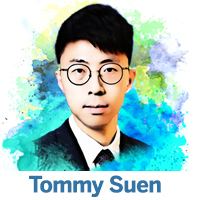In his latest Government Work Report to the National People’s Congress, Premier Li Qiang underscored the mission of the Hong Kong Special Administrative Region to deepen international collaboration and exchanges. Being a superconnector, Hong Kong must act decisively, tailoring strategic policies to its unique strengths under the “one country, two systems” principle and making this strategic pivot a key part of national development. Even if the ongoing geopolitical rivalries and self-doubt expressed by some skeptics are presumed against the city, we should not hesitate because procrastination is a distracted path to irrelevance. As Vice-Premier Ding Xuexiang points out, Hong Kong must resolutely respond to difficulties without retreating.

 Lau Siu-kai, a consultant of the Chinese Association of Hong Kong and Macao Studies, said Li’s emphasis this year underscores Hong Kong’s increasingly vital role in helping the country further open up amid the intensifying Sino-US rivalry. In 2011, the central government formally pledged support to the HKSAR’s participation in international and regional economic cooperation. The last time the State Council’s annual Government Work Report highlighted Hong Kong’s role in helping the country open up was in 2017. In 2022, when Hong Kong marked the 25th anniversary of its return to the motherland, President Xi Jinping asked the city to expand convenient and smooth international connections.
Lau Siu-kai, a consultant of the Chinese Association of Hong Kong and Macao Studies, said Li’s emphasis this year underscores Hong Kong’s increasingly vital role in helping the country further open up amid the intensifying Sino-US rivalry. In 2011, the central government formally pledged support to the HKSAR’s participation in international and regional economic cooperation. The last time the State Council’s annual Government Work Report highlighted Hong Kong’s role in helping the country open up was in 2017. In 2022, when Hong Kong marked the 25th anniversary of its return to the motherland, President Xi Jinping asked the city to expand convenient and smooth international connections.
The following discussion will focus on Hong Kong’s status as a superconnector. Financially, the city has adopted a package of measures to deepen financial reforms and innovation to expand international cooperation and dovetail with national developments such as plans to further open up the country as stipulated in Li’s Government Work Report. These policies aim at promoting wealth management, family offices, new shares’ listings and renminbi-denominated business. According to Hong Kong Financial Secretary Paul Chan Mo-po, the city is expected to become the world’s largest cross-border wealth management center by 2028.
It is worth noting that Hong Kong’s stock exchange came in fourth in the global IPO rankings last year, with nearly 90 percent of the offerings hailing from the Chinese mainland. Chan said he expects Hong Kong’s IPO market to be worth $17 billion to $20 billion this year, benefiting from optimism in the Chinese tech sector and support from mainland authorities. The “DeepSeek moment”, which took the tech world by storm, together with the revival of business confidence among big tech companies on the mainland, calls for a reassessment of the attractiveness of Hong Kong’s IPO market.
Our think tank supports the proposal to establish a carbon trade development center in the city. This is a proposal jointly endorsed by Hong Kong deputies to the National People’s Congress. To boost Hong Kong’s status as an international financial center, Vice-Premier Ding noted that Hong Kong could deepen cooperation with the mainland on fintech. Our think tank also supports efforts to promote the status of Hong Kong as an international mediation and arbitration center. Efforts to extend the frontiers of our arbitration service to cover cross-border sports arbitration are also applauded.
With regard to trade, the SAR government is eager to strengthen the city’s trade ties with countries in Southeast Asia, the Middle East and Central Asia. Chief Executive John Lee Ka-chiu has been on three official visits to seven Association of Southeast Asian Nations (ASEAN) countries, including Vietnam, Malaysia and Singapore, and also the Middle East since taking office. Key economic officials, such as Chan, have been on many such trips in pursuit of new trade opportunities. Closer trade ties may also encourage big companies in ASEAN and the Middle East to launch secondary listings in the city.
Local business groups are eager to forge closer economic ties with other countries. For instance, the Hong Kong General Chamber of Commerce will lead a delegation to the US next month in which it plans to meet local business groups and companies, and fight for meetings with trade officials. The Hong Kong-based Chinese General Chamber of Commerce has set its sights on strengthening connections with Central Asian countries, including Kazakhstan, as part of its 2025 agenda.
Sharing his takeaways from the two sessions on social media, Lee pledged to fully implement the spirit of the two sessions. He pledged that his government will use creative thinking, combined with market forces, to speed up the development of an international innovation and technology hub by developing the Northern Metropolis and the Hetao Shenzhen-Hong Kong Science and Technology Innovation Cooperation Zone. Excitement is building for many of Hong Kong’s biotech successes, although few foreigners have paid much attention to these breakthroughs. Nevertheless, the Chinese University of Hong Kong’s new modular robotic surgery system has not escaped our attention.
To have a balanced view, the skeptics are advised to pay more attention to the assurance of President Xi Jinping and other top officials in relation to Hong Kong and the recent emphasis placed by Premier Li on stability and order in his Government Work Report.
At the two sessions, the top Chinese policymakers painted a picture of a resilient economy that will grow stronger despite mounting external pressures and domestic challenges. Chinese policymakers mean what they say. Many foreign investment banks, including Deutsche Bank and Goldman Sachs, are now reassessing the Chinese market because of the rise of Chinese tech companies and are bullish on Chinese assets.
The skeptics should not lose sight of the fact that Beijing has given firm support to the city, which is the strongest guarantee of our long-term stability, sustainability and prosperity. Repeated assurances from the central government should convince skeptics and show the fountain of wisdom embedded in the “one country, two systems” governing model.
Tommy Suen is a community services officer for the Business and Professionals Alliance for Hong Kong Eastern District, and the director of youth development affairs of the Chinese Dream Think Tank.
Kacee Ting Wong is a barrister, a part-time researcher of Shenzhen University Hong Kong and the Macao Basic Law Research Center, chairman of the Chinese Dream Think Tank, and a district councilor.
The views do not necessarily reflect those of China Daily.


